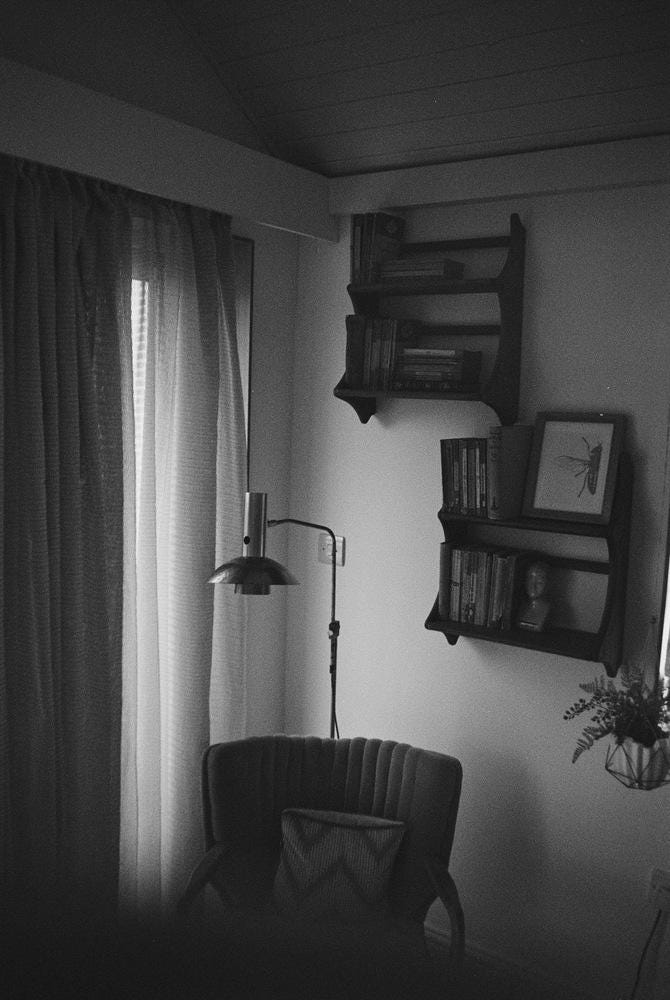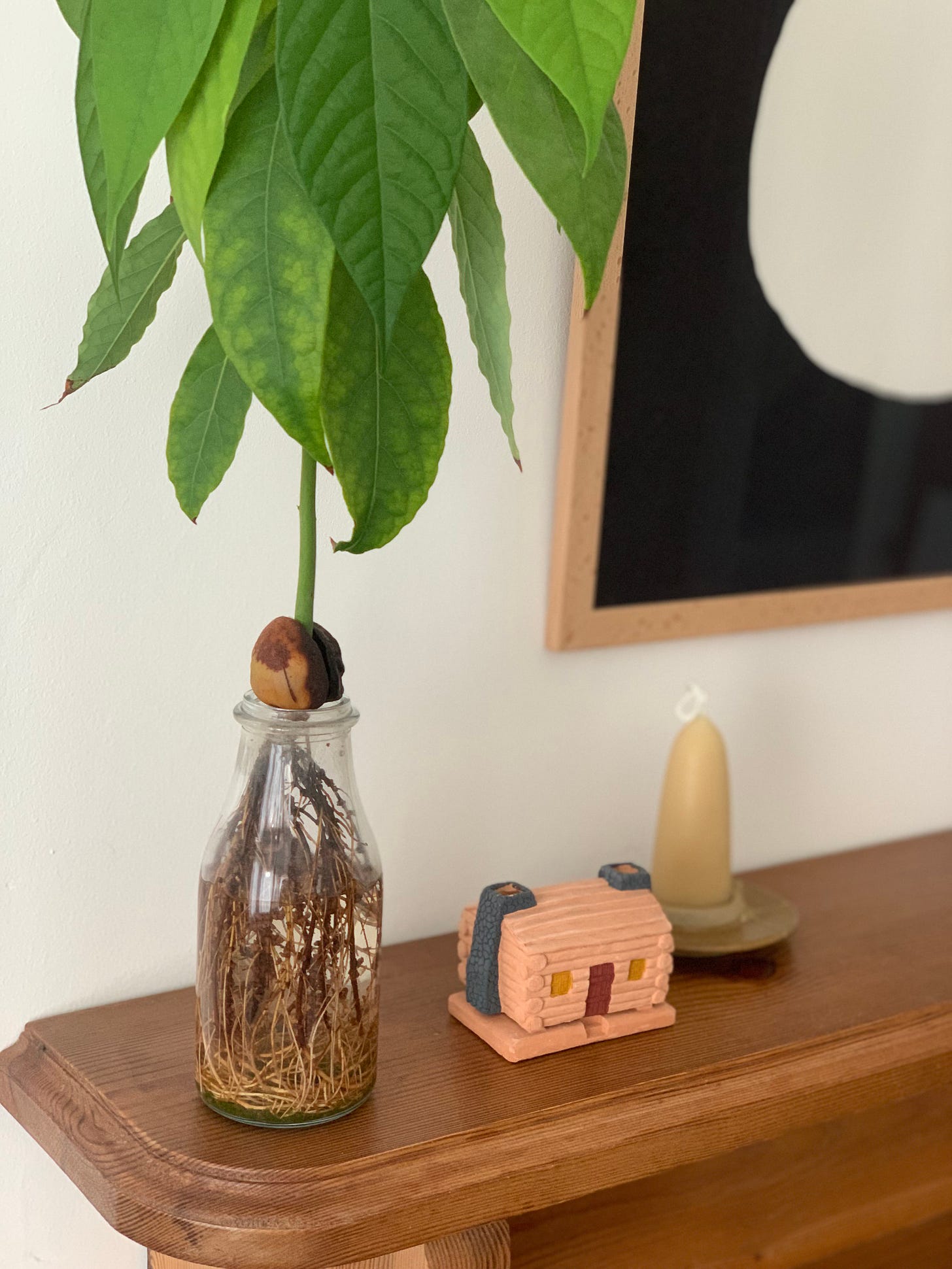Every place I've laid my head
Most of these places will forget me, and I will forget some of them, too. But for a moment, however brief, we belonged to one another - the bed, the house, and me.
There’s a kind of map I carry in my mind, not of cities or countries, but of beds. Of rooms where the light fell a certain way in the morning, or where I lay listening to the slow tick of a clock I didn’t know. A scatter of places where I’ve curled up under borrowed blankets or stiff hotel sheets, where I’ve fallen asleep with a book still open or listening to a podcast, or watching another episode of Lost.
I’ve always been fascinated by the quiet intimacy of temporary spaces. How, in the hush before sleep, the walls seem to soften and reveal the layers of other lives that have passed through. There’s something about resting your head in a place not your own that makes you both an intruder and a guest in the story of that house.
Some of those places are gone now. The bedroom with pale lilac walls in my childhood home, with the faint outlines of butterflies I painted when I was seven. The caravan in Wales, with its scratchy plaid sofas and a window overlooking a field: the sky always grey and heavy like wet slate. My grandparents’ spare bedroom, where I felt like a princess with a pea buried deep beneath the mattress. And yet, I can still feel the textures of them - the sense of who I was when I lay down in those rooms.
“A place belongs forever to whoever claims it hardest, remembers it most obsessively, wrenches it from itself, shapes it, renders it, loves it so radically that he remakes it in his image.” - Joan Didion
I think of this often when I remember the places I’ve slept, the temporary homes that, in some small way, I claimed by the simple act of closing my eyes there.
There’s an emotional archaeology to the places we sleep, a quiet excavation of who we were in each room. Every borrowed bed, every unfamiliar pillow holds a version of ourselves that existed only in that particular hour, in that particular light. The person I was falling asleep in a Premier Inn in Manchester on a work-trip, is not the same as the one who lay in an Amsterdam hotel with complimentary earplugs for the building noise outside, or the one who curled up on the sofa when poorly at my parent’s house. We leave traces behind - not physical things, but small, invisible imprints. The weight of a feeling, the residue of a decision made, a laugh shared in the dark.
Some places I can remember so vividly it feels as though I could peel back the years and step inside them again. Others have faded, but their emotional temperature lingers, like the afterimage of a candle flame behind your eyes.
Hotels have always fascinated me for that reason. They’re destinations in themselves - spaces designed to hold our in-between moments, to be both somewhere and nowhere at once. You arrive, inhabit them briefly, and leave no real trace beyond a faint indentation in the pillow, a towel flung over a chair. They’re anonymous and intimate all at once. Hundreds of people have passed through each one - laughed, cried, made love, stared at the ceiling - all within the same four walls. I appreciate their quiet, clinical predictability: the crisp white sheets, the unfamiliar lighting, the small thrill of a mini kettle. But I also love the tenderness of them.
I think of the hotel in Chicago, with its heavy patterned carpet, fresh fruity water in the atrium, and the plush weightiness of oversized white towels. The one in Brighton, where Matt turned thirty and we sipped ice-cold drinks on the balcony as the sky dimmed. The Isle of Wight in my early teens, with humongous breakfasts, lemon sorbet in generous scoops and nights where I spent long, half-waking hours imagining what I’d do with the rest of my life.
These were not homes, but they held pieces of life just the same. Waystations for lives in motion. Places that caught us mid-story, between leaving and arriving.
Then there are the more intimate, makeshift places - halfway between home and elsewhere. A damp tent pitched in a friend’s garden, the air thick with the scent of earth and rain, muffled teenage laughter drifting into the dark. The back bedroom at my husband’s family home, painted duck-egg blue and filled with nods to the sea. Not mine, exactly, but familiar now. Loved through repetition, through return.
And then, there’s the home you make with someone. The one you build slowly, not with bricks and mortar, but with routines, shared groceries, mismatched and the quiet, ordinary moments that gather into something solid. Even though the carpet might be worn, and the curtains aren’t to your taste, it’s yours. Or it feels like it is, in the ways that matter. I’ve found a kind of peace in the rooms we’ve made our own - in the way our books lean against each other on the shelves, how the kitchen smells like whatever we cooked last night, and how the bed is always a little rumpled and the creased in the shape of our sleep.

One of the places I’ll carry with me always is the little Airbnb we stayed in for our honeymoon. A soft, serene space with pale walls, wood floors, and windows that caught the changing Cornish light, framing it like a painting. I went swimming in the sea every day, salty and sun-drenched. I wore shades of ecru and white to celebrate our recent nuptials. It felt like we existed outside of time there. Long mornings, summer swims multiple times a day, coffee and wine drunk in the breeze, and evenings where we ate olives, bread and copious amounts of ice cream on the beach. At night I’d listen to the sound of the tide returning, reading, curled up under a blanket and a arm around my waist. A place that wasn’t ours, but held us as though it had been waiting for us.
There’s a quiet kind of trust in resting your head somewhere. It’s one of the most vulnerable things we do - to let the day fall away, to leave ourselves unguarded, and to give over to sleep in a space that isn’t entirely ours. Whether it’s a familiar bed or a stranger’s spare room, the act of closing your eyes in a place we don’t own is a small, instinctive way of claiming it, even if just for a night. It marks a kind of passage too - a temporary belonging, where the hours between dusk and morning are a shared secret between you and the room.
And it turns out that the most important place I’ve ever laid my head is the one I return to now. The one with the person I love. Where the lamp throws a familiar, honeyed glow across the room at night, and where I know, without looking, where the creaky floorboard is. It isn’t grand or perfectly decorated, but it holds us. It’s the place where the rest of the world recedes.
And after all the nights in other people’s guest rooms and anonymous hotel beds, this is the space that feels like mine, yours, ours. A home shaped less by architecture and more by the life unfolding inside it.
These sleeping places are stitched into the quilt of my life just as surely as the homes we’ve shared alone and together. Each one holds a version of me - the hopeful, the heartbroken, the restless, the content.
There’s a sacred ordinariness to it all. Most of these places will forget me, and I will forget some of them, too. But for a moment, however brief, we belonged to one another - the bed, the house, and me. A subtle imprint left behind.
To every place I’ve laid my head: thank you. For the restless nights and the deep, dreamless sleeps. For the mornings where light pooled across unfamiliar walls. For the way a space can leave a mark long after you’ve left it behind. Thank you for holding me, even just for a while.






